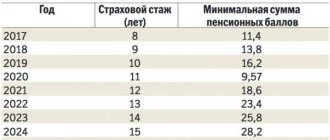Legal advice > Social security > Disability group 3 – features of receipt and types of benefits
Disability of the third group is a deviation of the physiological characteristics of the body, which are characterized by the presence of obstacles or restrictions in activity. All deviations are divided into sensory, physical, mental and mental.
Disabled people experience limitations in their full existence in society. That is why the state provides them with appropriate support.
The most frequently asked questions
Persons with disabilities enjoy various benefits and privileges. For disabled children there is a list of benefits, some of which are terminated after the child reaches adulthood. The state provides the following benefits for people with disabilities:
- medical;
- housing and communal services;
- tax;
- transport;
- social.
In addition, all disabled people receive a special pension, which is regularly indexed.
Read about the size of the disability insurance pension in this material.
A disability group is a certain status that is assigned to a citizen in connection with a disease he has that affects the degree of adaptation and leads to disability. In this case, disturbances may appear to be both physical and intellectual health.
The procedure for registering disability is regulated by Federal Law No. 181 “On the social protection of disabled people in the Russian Federation.”
According to the law, in order to recognize a citizen as disabled, he must have a persistent limitation in his life activity, leading to the inability to fully serve himself, work, communicate, or exercise control over his own behavior.
There is only one way to register a disability: by contacting the Bureau of Medical and Social Expertise (MSE). ITU performs the following functions:
- establishing the fact of disability;
- finding out the reasons why a citizen became disabled;
- establishing the time period during which the status will be valid;
- identifying the degree of a citizen’s need for social protection.
To undergo an examination, you need to contact your doctor and inform him of your intention. The doctor must issue a referral for examination, on the basis of which the necessary studies will be carried out.
To obtain disability, you should collect the following list of documents:
- a referral signed by the attending physician;
- identification document (passport);
- a copy of all completed pages of the work book;
- certificate of income for the past year;
- outpatient card and extract from a medical institution;
- characteristics from the place of work or study;
- application for examination;
- in case of a work-related injury or occupational disease, it is required to present a report drawn up in a special form.
Carrying out emergency medical examination
The forensic examination is carried out on the basis of a bureau that has the license necessary to carry out expert activities. In some cases, the examination may be carried out at home. This only happens if the citizen is unable to appear at the bureau due to his serious health condition.
Experts must:
- assess the health status of the applicant;
- take all necessary tests;
- study the psychological characteristics of the subject;
- get acquainted with the working and social characteristics of the candidate.
After completion of the examination, an act must be drawn up recognizing the citizen as disabled or refusing to assign him this status. A disabled person must receive a certificate of disability, in addition, an individual rehabilitation program is developed for him.
Important! The act recognizing a citizen as disabled and the duration of validity of this status is drawn up in two copies. One is sent to the Federal Bureau of ITU, the second to the pension fund.
If a refusal is received, a citizen has the right to file a complaint with the bureau of medical and social examination, which took over his examination. Within three days, based on the complaint, a decision must be made on the need for a re-examination.
The second examination is carried out no later than 30 days from the date of filing the complaint.
If there are clear signs indicating the need to assign the status of a disabled person, but the experts have not found grounds for this, you can appeal their decision in court.
Important! When sending a complaint to the bureau, you can demand to change the composition of the commission that carried out the examination.
People with disability status must undergo regular re-examination. Disabled people of the third group should undergo this procedure once a year.
Special conditions apply for disabled children. The frequency of their examination depends on the identified pathology.
If disability has been assigned to a citizen who has reached retirement age, in some cases he can do without re-examination.
Let's look at the most common questions regarding disability of the third group.
Is it possible to work
A disabled person of the third group can work, although he has restrictions on work in certain areas. It is important to remember that some types of activities can cause a deterioration in a citizen’s health.
The status can be withdrawn if the citizen has regained his health or has not applied for re-examination to the ITU.
The list of professions that a disabled person cannot choose is determined by the medical commission on an individual basis.
Assignment of group 3 disability is possible only after passing an examination. Despite the fact that obtaining the status of a disabled person can take a lot of effort, thanks to it you can receive a number of benefits provided for by Russian laws, which should not be refused.
Only serious illnesses that interfere with the normal process of life, work, educational activity, and independence can become a significant reason for establishing incapacity. Such illnesses can render a person unable to work.
That is why degrees of restrictions on the work activities of disabled people have been created. 1 and 2 imply serious pathologies in which a person needs help from others to exist and perform everyday tasks. As a result, they both belong to non-working disability groups.
The only category in which work is allowed is the third working group of disability. It includes many benefits that make the work process easier for the patient, however, he can receive a full salary in his position.
Having found out which disability group is working, it is worth taking a closer look at its features. Disabled people of categories 1 and 2 are completely deprived of the opportunity to work. Those who are awarded category 3 have it, but with some restrictions and features.
Often, employees who suffer a serious injury that causes incapacitation are forced to take a job at a less prestigious company, take a lower position, or receive a demotion. However, at the same time, their working conditions are improved, including disability group 3 with 1 degree of restriction on work activity, which gives the right to ensure the working conditions prescribed by the rehabilitation program.
According to the legislation of the Russian Federation, all people with working disability group 3 have equal rights when applying for a new job. Every public or private company and organization is required to have at least 4% of its employees with partial disabilities.
In return, employers receive simplified taxation and other benefits from the Government. Thus, the state tries to help able-bodied patients to ensure a decent life for themselves. Therefore, any person who has become disabled 3 degrees can easily get a job in accordance with their education, skills and abilities.
It is impossible to say unequivocally where you can get a job and how much they pay for group 3 disabilities. In accordance with the procedures established in our country, all incapacitated citizens who get a job have the following rights:
- reduction of working hours while maintaining full wages;
- increased number of vacation days during one calendar year;
- mandatory provision of working conditions prescribed by the patient’s rehabilitation program;
- the inability of the employer to call a sick employee to work at night or overtime without his written consent.
In this case, significant reasons for assigning grade 3 are organ and tissue transplants, partial or complete blindness, foreign bodies in the head box, the absence of some fingers or hands, and pathologies in the structure of the chest.
Thus, disabled people of category 3 can fully engage in labor activity. According to statistics, the number of people employed in this category is growing every year.
There is a standard procedure for obtaining this status:
- Find a specialized medical institution that has the right to conduct such a procedure.
- Receive a referral from your attending physician to undergo a medical and social examination.
- Provide the necessary documents to the ITU and undergo an inpatient examination.
- Come to the ITU and prove the need to grant a person a disability.
Pension benefits should be issued after disability status has been granted.
When registering a disability, citizens often have questions, since there are many nuances in this procedure.
And it’s better to deal with all the issues in advance - so as not to get problems at the very beginning of applying for disability and benefits.
Is it possible to work
It should be understood that this disability group is a working one and has no contraindications to work.
But still, in some cases, measures may be taken to restrict labor in certain professions.
You can also carry out work under special conditions. Because complications may arise in a citizen’s health.
What professions are available
For disabled people in the labor category, there is a list of professions that are suitable for them due to health reasons.
Note! Here you can highlight many options for work in the following areas of work:
- automobile mechanic;
- advertising agent;
- sales manager;
- insurance agent;
- legal services;
- archival work;
- administrative position;
- architects;
- work as a bartender;
- working in the library;
- accounting activities;
- medical worker;
- educators;
- work as a cloakroom attendant;
- housemaid;
- design activities;
- courier work;
- Painting works;
- operator activity.
To become a driver, a disabled person must obtain a decision from a medical commission on permission to drive a vehicle. When employing a person with the third group, it should be remembered that driving a vehicle is an occupation with harmful conditions, which can contribute to the deterioration of health. Most often, transport work activity has contraindications.
According to labor legislation, an employee with a third disability group should not work more than 40 hours a week.
Such employees are prohibited from being required to work overtime. Consequently, the length of the working day for an employee with a third disability group differs from that of healthy individuals.
The legislation does not provide for a reduction in working hours for this category of citizens. However, the Labor Code allows an employer to hire a disabled person on a part-time basis. This is declared by Article 93; the number of working hours must be agreed upon with the management of the organization.
Attention! Our qualified lawyers will assist you free of charge and around the clock on any issues. Find out more here.
Main aspects
The status of a disabled person is needed in order to receive from the state not only material, but also social support. At the same time, disabled people of the third group are considered the “lightest”, therefore they receive minimal benefits.
What it is
As mentioned above, disability is a persistent limitation in life activity associated with a violation of any aspect of the functioning of the body. Russian legislation provides for three degrees of disability:
- 1st degree. The most severe health disorders, in the presence of which adaptation is significantly impaired. Citizens who have received first-degree disability are entitled to maximum benefits;
- 2nd degree. Includes impairments of moderate severity;
- 3rd degree. The violations are minimal, but they still lead to disruption of functioning and lead to a change in the social status of a person, and therefore he requires social and material support.
Diseases, the presence of which can be assigned to the third disability group, can be divided into several categories:
- diseases of internal organs, including malignant tumors;
- impairment of motor function, vision or hearing;
- diseases associated with a person’s mental health and reducing his ability to care for or control himself;
- pathologies of the cardiovascular system;
- diabetes.
The list of diseases for assigning group 3 disability is regulated by federal laws.
Order of the Ministry of Labor No. 1024n specifies criteria that allow, during a medical and social examination, to assign a citizen the status of a disabled person of the third group.
The main criterion is the severity of the existing dysfunctions of the body, which can vary from mild to severe.
Important! After determining the degree of disability, if his health condition worsens, a citizen has the right to apply for a re-examination.
And the citizen will need to go through all stages of this procedure in order to obtain this status.
It should be understood that you cannot always count on an unambiguous decision on granting a disability group.
Even if the applicant’s attending physician is confident in the possibility of obtaining disability, it is not a fact that the medical commission will have the same opinion.
What it is
They can relate to both physical health and mental health. Based on the degree of impairment, a diagnosis is made and a disability group is assigned.
It is necessary to understand that you need to prepare not for receiving a specific disability group, but for establishing such a status in general. Since a citizen cannot know exactly which group will be assigned to him.
It is on this basis that the state provides a person with the opportunity to receive additional funds.
After all, even with the third group of disabilities there is not always a chance to get a good job and develop professionally. At the same time, a number of professions can be included in the prohibited list for a person.
The status of a disabled person provides options for both material and social support for citizens. And this allows them to get an additional incentive to develop and find work.
What is permitted by law for the third disability group and is a simpler case.
The legislative framework
All conditions for the procedure for assigning and issuing status are prescribed in federal legislation.
The third disability group is regulated by general legislative projects for all three groups:
- Federal Law No. 181 - fixes the categories of citizens who have the right to obtain the status of a disabled person;
- Order of the Ministry of Health of the Russian Federation No. 247 - fixes issues and assignment of lifelong disability. In addition, there is a list of certain pathologies;
- Order of the Ministry of Health and Social Development - determines the list of diseases that belong to the group of corresponding disabilities.
There are also other bills that regulate the nuances associated with disability. They can be found in the current legislation.
*Download Federal Law-N-181-FZ-from-11/24/1995
*Download Decree of the Government of the Russian Federation dated February 20, 2006 N 95.
Working or not
Disabled people of the third group can independently carry out labor activities. However, their qualifications may be reduced or the amount of work reduced. People with the status of disabled people of the third group have some labor restrictions, and therefore the citizen must be provided with social protection and material support.
In order for MSEC to confirm a disability, certain conditions must be present:
- A persistent disorder of key life functions, provoked by an acquired pathology and its severe consequences, trauma, etc.
- Narrowing of the ability for full self-care, communication with other people, orientation in the environment, self-control.
- The need for medical correction and rehabilitation, social support.
Only one of the mentioned points is not enough to form a group - at least two are required. All features of each specific case are carefully checked by competent members of the commission, acting in accordance with the requirements of the law.
There are working and non-working disability groups; this year the criteria for determining them were revised. Disabled people, according to the law, receive full rights to pension payments and a package of social benefits. What the amount of the pension will be depends on the disability group; in Russia it is expected to increase by the end of this year.
If the law requires two types of pension at once, then the applicant must choose only one of them. At the same time, the monthly financial payment does not stop; a set of social services is provided, which, if necessary, can be replaced with monetary compensation. Insurance assistance is paid when a person has insurance coverage.
When considering questions about the advisability of assigning a disability group, the real cause of the resulting disability must be taken into account. It is allowed to indicate the following factors:
- general illness – indolent pathology or domestic trauma;
- injury received during the production process while a person was at the place of work, on the way to or from it;
- occupational illnesses that arose as a result of exposure to harmful production factors;
- injuries acquired during combat operations, during military service, as well as during the Patriotic War;
- genetic developmental abnormalities, complications of childhood illnesses;
- radiation exposure.
In order to prove the true cause of disability, the applicant is required to provide relevant documentation. In the absence of such, a note “general disease” is made. Sometimes it happens that disability is caused by more than one factor. In this situation, the disabled person himself or his official representative chooses the reason, which will serve as the reason for starting the examination.
These are patients with serious diseases such as:
- oncological tumor with numerous metastases, frequent relapses;
- hematological pathologies characterized by poor blood clotting, the formation of cancer cells, etc.;
- complete paralysis;
- amputation of the upper or lower limbs;
- blindness, deafness, muteness, etc.
People with such pathologies become completely disabled, because their physical condition really does not allow them not only to work, but also to care for themselves. It is extremely rare that they can perform some types of work, but still require outside care. There are special enterprises where there are suitable conditions for the blind or deaf-mute. People with damaged legs are also sometimes involved in certain types of work.
Potential reasons for assigning a group:
- disorders of the gastrointestinal tract, pancreas;
- disorders of the central nervous system, PNS;
- deviations in the functioning of the auditory or visual analyzers;
- dysfunction of the liver, renal system, heart.
Patients do not require constant care, but they often require special adaptations to survive. For example, after amputation of one limb, a person is able to move only with the help of a prosthesis, crutches or a wheelchair. Patients who have undergone bladder resection need special reservoirs to collect urinary fluid.
Although group 2 disability is recognized as non-working, professional work is allowed if it does not lead to aggravation of the disease.
The following benefits are provided for disabled people participating in the industrial process:
- short work day;
- additional and extended breaks;
- easing production standards;
- medical supervision.
Disabled people perform simple household chores and take care of themselves without any problems; they have a “residual” ability to work, so this category is considered a working disability group in Russia. It is necessary to clarify that such persons are guaranteed favorable working conditions. For example, if a person previously worked on the night shift, then he can be transferred (if he wishes) to a position in which he can perform duties during the daytime.
Disabled people are entitled to financial assistance on behalf of the state; they are provided with free medicines, crutches, a wheelchair, etc. If a person is unemployed, then he can pay only half of their cost for some pharmacological drugs and medical prescription products. You are allowed to use public transport without paying for the fare.
Based on the results of the review, MSEC extends or removes disability, and if the patient’s health status changes (deterioration or improvement), it can change the group. If the patient is on an old-age pension, permanent disability of group 3 may be indicated.
Thus, to obtain a disability group there must be objective reasons. The applicant is obliged to provide the special commission with a complete package of documents (their list is provided above). The latter are official confirmation of the fact of disability, the need for financial assistance, and all possible protection from the state.
Diseases due to which people receive group 3 incapacity may be:
- Speech function disorders;
- Incorrect functioning of the circulatory system;
- Problems with mental functions;
- Deformities associated with appearance;
- Problems with the senses (eyes, ears) and tactile capabilities of the body.
This also includes asthma and arthritis.
With such disorders, a disabled person is able to perform household chores and engage in self-care:
- Shower;
- Managing natural needs;
- Cooking, moving;
- Orientation in space;
- Communication with strangers.
There is no separate list of work and non-work diseases, but there are restrictions depending on the degree of the disease:
- If a person has a first degree, this means that he can perform work according to his qualifications in an equipped specialized workplace, if it can be provided based on the nature of the activity. Also, a disabled person is allowed to work in professions that require lower qualifications, and the conditions of activity will be discussed;
- The second degree involves working only in specialized jobs;
- With the third degree, a disabled person does not engage in professional activities.
Category No. 3, like any other, is established based on the results of a medical and social examination. To receive a referral for it, a citizen goes to the clinic and goes to his general practitioner (attending physician). Sometimes authorities for assistance and protection of people with disabilities, a representative office of the Pension Fund (by registration) or a court can refer you for an examination.
To pass, a certain package of documents is collected:
- Statement;
- Referral for examination;
- Certificates, tests, x-rays;
- Employment history.
After waiting his turn, the citizen gets to the ITU. Based on its results, doctors, by voting, make a verdict on assigning the status of a disabled person (or refusal to do so) and determine the terms (for the third group, either 1 year or indefinitely).
The document regulating the conditions of the ITU is Order of the Ministry of Labor No. 1024n, which specifies:
- Procedure for passing the commission;
- Required papers;
- Equipment needed for the examination;
- Possibility of appealing the verdict;
- Deadlines for assigning disability;
- List of defects for certain categories of disability.
The Order also states what can be considered a working group, and under what circumstances a citizen is not allowed to work.
After passing a medical and social examination and assigning disability group 3, the degree of the disease will also be indicated in the conclusion. This is the reason for possible restrictions at work for a disabled person.
In conclusion, the commission will prescribe additional nuances, for example, the right to a shortened working week.
A person can challenge the commission’s decision by filing a complaint with a higher ITU bureau indicating the arguments. Within a month after this, the bureau will review the controversial verdict and give the opportunity to re-pass the examination.
If the second instance did not give the opportunity to go through the ITU again or the doctors’ verdict has not changed, then the disabled person has the right to once again write a petition to review the results, this time to the main bureau.
In this case, consideration of the complaint will also last for thirty days, after which a decision will be made to conduct a re-examination.
The disability group can be re-qualified during the next ITU examination or after filing a complaint due to dissatisfaction with the results of the commission.
Disability could be assigned for reasons other than necessary (for example, instead of “oncology” the papers indicated “general disease”).
In order to re-pass the examination to requalify the group, you will need to collect documents again and receive a referral to the ITU.
In medical practice in Russia, disability is divided into three groups – I, II and III.
Features of disability group 3
Disability group 3 - minor health impairments
The third disability group in most cases is given to people with social disabilities. They need social protection. Patients experience poor health and persistent, mildly or moderately expressed disorders of body functions.
They occur against the background of injuries or defects. Which may limit one or more categories of human life. The third disability group is established for patients who have appropriate indications.
Such people are able to take care of themselves. At the same time, they use auxiliary means. A person can move independently. This takes much longer than a healthy person. A disabled person can study in appropriate institutions.
In this case, a special regime of the educational process must be observed. Some people with disabilities need to use assistive devices to learn. In some cases they need help from other people.
Disabled people of the third group can independently perform labor activities. At the same time, they need to reduce their qualifications or reduce the amount of work they do. Disabled people, as a rule, cannot perform work in their profession.
If a disabled person uses assistive devices, he will easily be able to navigate time and space. A disabled person can communicate with other people. In this case, there is a decrease in the speed of communication. A disabled person perceives information in reduced volumes.
A group 3 disabled person is a person who can independently care for himself and also perform certain activities.
How is the pension calculated?
Since April 2020, disabled people of the third group receive a social pension in the amount of 4,508 rubles. The pension is calculated monthly.
Payment amount
In addition to the social pension, disabled people of the third group can also receive one-time payments, the amount of which for 2020 is 2162 rubles. To receive such a payment, a citizen must provide the following documents to the Pension Fund:
- passport;
- certificate of disability;
- pension insurance certificate.
Old age pensions and social benefits for disability will be preserved in full. In addition, if a disabled person works, his pension payments will be adjusted taking into account contributions.
The size of the EDV when working as a person with category 3 incapacity will also not change.
How much pay
In 2020, disabled people of group 3 of any age category are paid 4215.9 rubles/month. The labor pension is determined by a formula; length of service is always taken into account.
Minimum amounts:
- 2402.56 rub. paid to singles;
- RUR 4,004.26 – with 1 ward;
- 5605.96 rub. – with 2 wards;
- 7207.66 rub. – with 3 wards.
Marital status and the need to obtain benefits determine the amount of the pension.
If a disabled person wants to apply for social benefits or the lowest salary, he can find out the total amount of payments in advance because the EDV does not change.
The pension for disabled people of category 3, taking into account length of service, is determined by the formula: TPPI = PC/(T x K) B, where:
- PC – the amount of pension savings in the Pension Fund at the time of calculations.
- T – estimated period for provision of labor pension payments – 228 months.
- K - the ratio between the duration of insurance payments, the date of retirement and 180 months. At the age of 19, this length of service corresponds to 12 months, then another 4 months are added every year.
- B – initial amount of pension for disabled people of the 3rd category.
https://youtu.be/R_-T5qFzvvk
Information about pension payments is provided by employees of the Pension Fund branch.
How to calculate correctly
In order to calculate a pension, data is required on the citizen’s work experience, working conditions, average salary, etc.
P = warhead midrange low frequency, where:
- P - labor pension;
- BC - base part;
- SCh - insurance part;
- NC is the funded part of the pension.
SP = PC/(TxK). The formula includes:
- PC - estimated pension capital;
- T - payment period;
- K is the ratio of the length of work experience to 180 months.
The procedure for employing a disabled person according to the Labor Code
Employment of citizens with the third group of disabilities is characterized by its own characteristics. The employment procedure is as follows.
The citizen must provide the employer with the following list of documents:
- identification document;
- work book;
- application for employment;
- a certificate indicating the third group of disability and a list of restrictions in work activity;
- an individual rehabilitation program, which specifies recovery procedures.
The employer, having examined all the documents, makes a decision: whether the working conditions for this vacancy adequately correspond to the medical recommendations of the citizen wishing to get a job. Only after this is an order issued for enrollment.
A new employee is assigned to a position without a probationary period and is provided with the required working conditions.
If an employer does not hire a disabled person within the quota, he will be subject to administrative penalties (a fine of 2-3 thousand rubles). An exception will be the presence of a special certificate with a note indicating the citizen’s incapacity for work or contraindications for this type of activity.
ATTENTION! View the completed sample job application:
What benefits and payments are provided?
Disabled people of the third group are provided with a number of benefits.
Pensions
The size of the pension depends on the length of service, the reasons for which the disability occurred, the presence of dependents and a number of other factors. In this case, payments can be both federal and regional. Insurance pensions for disabled people in 2020 were indexed by 7%. State disability pensions are received by military personnel, persons affected by ionizing radiation or man-made emergencies, participants in the Great Patriotic War and people who lived in Leningrad during the siege. The size of the social pension does not depend on length of service and ranges from 4 to 5 thousand rubles.
Social payments
Disabled people of the third group have the right to receive a one-time cash payment, the amount of which is indexed every year.
In addition, both adults and disabled minors have the right to receive a set of social services, which includes:
- provision of medicines;
- the opportunity to pay half as much for housing and communal services;
- providing vouchers to resorts and sanatoriums;
- free travel on suburban transport.
Important! If desired, a disabled person can replace services with their monetary equivalent.
Additional payments
If the income of a non-working disabled person of the third group does not reach the subsistence level, he can receive a federal social supplement. The amount of the surcharge is set depending on the cost of living in the region.
Benefits
Disabled people of the third group have the right to the following benefits:
- severance pay after dismissal for medical reasons;
- benefits for injuries at work;
- benefits for caring for a citizen recognized as disabled.
Work restrictions
Any restrictions on the implementation of labor activities are determined for each disabled person of the third group by a medical commission.
Also, the medical examination determines a list of professions in which it is prohibited to work, in order to avoid further progression of complications, or the occurrence of situations dangerous to health or life.
In addition, disabled people of the third group may be provided with preferential benefits in the form of increased annual leave of up to sixty days for the purpose of rehabilitation.
https://youtu.be/09_9msTHxKk
General provisions and recent changes
The Law on Social Protection of Disabled Persons No. 181 Federal Law was adopted in 1995 and since then has been supplemented, amended and adjusted more than twenty times. Certain articles of the federal law were declared invalid, and some additions were made to the existing paragraphs. This law was last amended this year. There are a number of articles that form the basis of this law. These are the following general provisions:
- definition and classification of groups;
- social protection of persons with disabilities;
- organization and conduct of special examination;
- rehabilitation of disabled people;
- material support and medical care.
In 2020, some additions were made to the law on persons with disabilities. First of all, pensions have been increased for children who have the first group of disabilities due to a congenital disease. This amount will be 13,170 rubles. Payments to disabled people will be indexed by 5.8%, and pensions will be increased by 2.6%. The monthly payment that a disabled person is entitled to for the purchase of medicines and medical nutrition has increased to 807 rubles.












